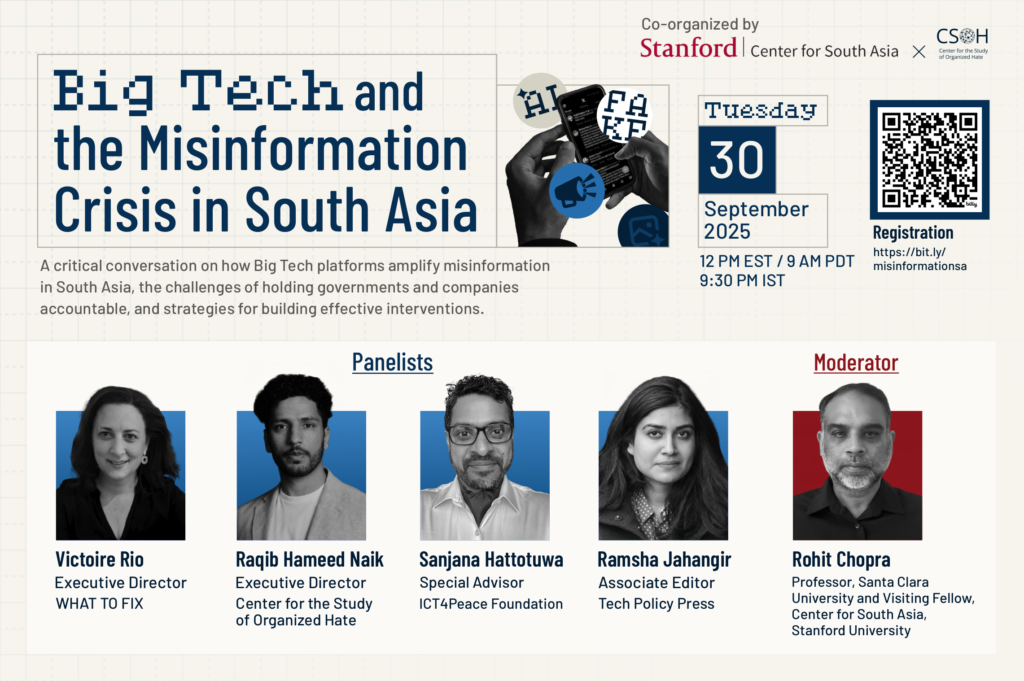Over the last decade, misinformation, in the form of propaganda, fake news, hate speech, conspiracy theories, and AI-generated synthetic hate, has had a seriously deleterious impact on social and political life across the globe. From anti-vaccine conspiracy theories and prejudiced narratives about religious and ethnic minorities to falsehoods targeting dissidents and political figures, misinformation has strained social cohesion, amplified public health crises, legitimized extremism, compromised election outcomes, and eroded trust in democratic institutions.
Used by both state and non-state actors, social media platforms and networks, including X (formerly Twitter), Facebook, Instagram, WhatsApp, Youtube, Telegram, and more recently AI tools, are a central part of the global misinformation economy. The practices of so-called Big Tech firms, particularly the algorithmic amplification of harmful content and the lax enforcement of their own content moderation policies and guidelines, have also significantly contributed to the crisis of misinformation.
The consequences in South Asia and Southeast Asia have been especially severe: Facebook’s role in enabling genocide in Myanmar; incitement of violence in Sri Lanka; the Hindu far-right’s weaponization of anti-minority sentiment in India, resulting in offline attacks against Muslim and Christian communities; the use of social media in Pakistan to organize mob violence over blasphemy accusations; and a flood of disinformation during the May 2025 India-Pakistan military conflict.
Bringing together a distinguished group of speakers, the panel, jointly organized by the Center for South Asia at Stanford University and the Center for the Study of Organized Hate (CSOH), will explore the multifaceted role played by Big Tech in South Asia’s misinformation crisis. Panelists will examine the legal and policy challenges posed by misinformation, present case studies of its real-world harms, analyze barriers to holding governments and technology companies accountable, and discuss strategies and opportunities for meaningful intervention.
Panelists
Victoire Rio
Victoire Rio is the founder and executive director of WHAT TO FIX, a tech policy and accountability nonprofit, and a leading expert on social media monetization and its impact on information integrity. Prior to founding WHAT TO FIX to address systemic risks associated with social media, Victoire spent 8 years leading tech accountability efforts in Myanmar, where she co-founded and led the Myanmar Tech Accountability Network.
Raqib Hameed Naik
Raqib Hameed Naik is the Executive Director of the Center for the Study of Organized Hate (CSOH), a research and policy organization based in Washington, D.C. He is also a Fellow with the Human Rights Project at Bard College, New York.
Dr. Sanjana Hattotuwa
Dr. Sanjana Hattotuwa did his doctoral research on the intersection of social media, political communication, propaganda, and information disorders in Sri Lanka, as well as how New Zealand’s Christchurch massacre in March 2019 was represented on Twitter. Specialising in and advising on social media communications strategy, digital security for journalists and human rights defenders, social media activism, online advocacy and grounded, mixed-methods social media research, Hattotuwa’s experience in studying, negotiating, and developing policies against information disorders spans two-decades, and work in South Asia, Southeast Asia, North Africa, the United States, Europe and the Balkans. He founded in 2006 and till June 2020 curated the award-winning Groundviews, Sri Lanka’s first civic media website. From July 2021 to October 2024 he was the Director of Research at The Disinformation Project, based in New Zealand. He remains a Special Advisor at the ICT4Peace Foundation, based in Switzerland. Sanjana regularly gives input to leading social media companies on how they can strengthen platform integrity, better identify inauthentic behaviours, malevolent constellations, and prevent the abuse of products.
Ramsha Jahangir
Ramsha Jahangir is an Associate Editor at Tech Policy Press. Previously, she led Policy and Communications at the Global Network Initiative (GNI). As an award-winning journalist, Ramsha has extensively reported on platform power & politics, internet governance, and digital authoritarianism. She holds a Master’s in Journalism, Media, and Globalisation from the University of Amsterdam.
Moderator
Dr. Rohit Chopra
Dr. Rohit Chopra is Professor in the Department of Communication at Santa Clara University and Visiting Fellow at the Center for South Asia at Stanford University. His research covers several areas including: global online communities, with a focus on Hindu nationalist and right-wing groups; violence, hate speech, and rights in online and physical publics; the relationship of media, culture, and political memory; and disability in global culture and media. Rohit is author, most recently, of The Gita for a Global World: Ethical Action in an Age of Flux (Westland, 2021) and The Virtual Hindu Nation: Saffron Nationalism and New Media (HarperCollins, 2019).
